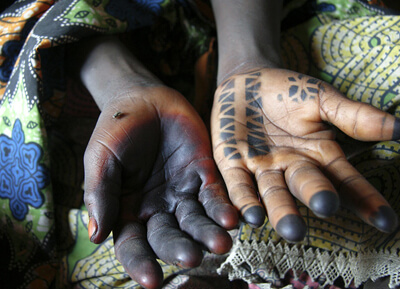
MICHELLE LOKOT, a gender advisor with World Vision Australia, writes about the issue of child marriage…
Today is International Women’s Day: one day set aside to focus on women and girls, to celebrate their resilience and courage and draw attention to the discrimination and violence they continue to face. In my travels, I’ve certainly seen progress for women and girls in accessing the same status, rights and opportunities as men and boys, but there is still much to be done.
For me, one of the most confronting issues is early child marriage – where girls are married before the age of 18. One in seven girls in the developing world is married by the age of 15. While early child marriage is motivated by a range of factors, the practice often occurs due to cultural beliefs that a girl’s main purpose is to get married, have children and look after a household. Educating a girl is not seen as a priority.
 |
|
A 13-year-old child bride shows her hands painted with henna dyed in preparation for her marriage to a 38-year-old man. Niger, 2012. PICTURE: World Vision Australia “For me, one of the most confronting issues is early child marriage – where girls are married before the age of 18. One in seven girls in the developing world is married by the age of 15. While early child marriage is motivated by a range of factors, the practice often occurs due to cultural beliefs that a girl’s main purpose is to get married, have children and look after a household. Educating a girl is not seen as a priority.” |
The consequences of early child marriage are enormous. Girls aged between 10 to 14 are five times more likely to die during pregnancy or childbirth than women aged 20 to 24 (UNFPA, 2011). They are less likely to remain in school. These girls are often married to men older than them, making it difficult for them to negotiate issues like when sex occurs, whether contraception is used and how their children will be spaced.
Early child marriage is also linked to a decrease in decision-making power, decrease in opportunities for socialisation, increased HIV transmission and increased violence.
I recently visited Papua New Guinea (PNG), where ‘bride price’ is practiced in many communities. In the province of Madang, when a girl is to be married, the groom and his family provide shells, animals and cash to the girl’s family. This kind of transaction tends to reinforce social, cultural and religious beliefs that the woman is inferior and the property of the man.
This poem, written by a woman in PNG in 1968, echoes what I hear from women even now, not just in PNG, but in places all over the world:
“I am a woman, born in the village
Destined to spend my life
in a never ending vicious circle
Gardening, child-bearing, house-keeping
Seen and not heard.”
World Vision is responding to these social and cultural beliefs that constrain girls’ opportunities. We work to create opportunities for community conversations to trigger changes in attitudes. Engaging community leaders and parents is critical, alongside advocacy to change legislation so that child marriage becomes prohibited by law. This week, World Vision launched a report, called Untying the Knot, which calls upon governments and the international community to end early marriage by 2030.
Part of World Vision’s role is communicating the benefits of education to families, so that they recognise the importance of girls being educated. Studies show that when girls are educated, they end up marrying later, spacing their children further apart and having less children overall. Education reduces the chances of mother and child dying during childbirth because of the mother’s increased access to health information. If a mother is educated, her future children are more likely to attend school. When a girl is educated, she has greater ability to voice her opinions and make decisions, and it increases her earning potential in the future.
For me, International Women’s Day is about making issues like early child marriage visible, so that practices and customs can change and so that girls and women will be treated with respect.
Michelle Lokot is a gender adviser at World Vision Australia.





